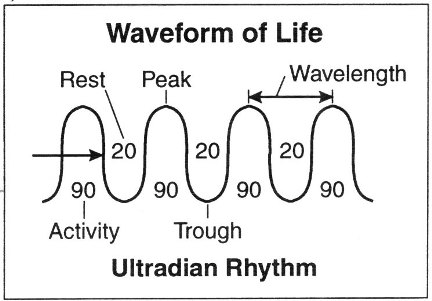Sprints, or periods of intense focus, allow us to concentrate on our tasks and complete them with exceptional clarity of thought. But what’s fascinating is why they make us perform so well.
According to Leo Widrich of Buffer, it’s rooted in our human nature. While we often envision ourselves as machines that move linearly, we are actually organisms that move cyclically. To unleash our most creative and productive work, we need to align with that rhythm.
Your brain can only sustain focus for 90 to 120 minutes before requiring a break, reports Widrich. Why? It’s due to the ultradian rhythm, a cycle that exists in both our sleeping and waking lives.
As Tony Schwartz has shared, this discovery was first made by Nathan Kleitman, a pioneering sleep researcher. Kleitman referred to it as the “basic rest-activity cycle,” the 90-minute cycles during which we progress through the five stages of sleep. Kleitman also found this 90-minute pattern in our waking hours as we transition from higher to lower levels of alertness—the ultradian rhythm.

What does working in sync with this rhythm entail?
The 90-minute cycle proves effective. Schwartz wrote a book in less than six months by structuring his workday into three 90-minute chunks.
Even without consciously reading productivity posts (we assume), professionals in other fields have also discovered the 90-minute rhythm. In a widely cited study on prodigious violinists, psychologist Anders Ericsson found that top performers shared similar practice characteristics:
- They practiced in the morning.
- They engaged in three practice sessions.
- Each session lasted 90 minutes or less.
- There was a break between each session.
Schwartz reports that this same pattern is observed among other high achievers: focused effort followed by rest, then repeated.
However, as eloquently expressed by Tom Gibson, a digital strategist, in a thought-provoking Medium post, these natural ebbs and flows “form the organic labor pattern” and should not be seen as something to be “overcome or ignored.” By understanding and embracing these rhythms, you can enhance your work performance, just as understanding a truck’s engine mechanics enhances its performance.
Therefore, the time you dedicate to unplugging becomes an integral part of your workday, rather than being opposed to it, as Gibson emphasizes:
“We need to incorporate ‘off time’—the outward breath, the ebb—into our working patterns. Not merely paying lip service to the idea of ‘getting better sleep,’ but considering it as an essential and affirmed part of the working process…
We must understand that ‘being on’ is impossible without ‘being off,’ and that the gap between the two needs to be narrowed—like the beats of a heart or the steps of a runner.”
The origin of the 8 hour work day and why we should rethink it